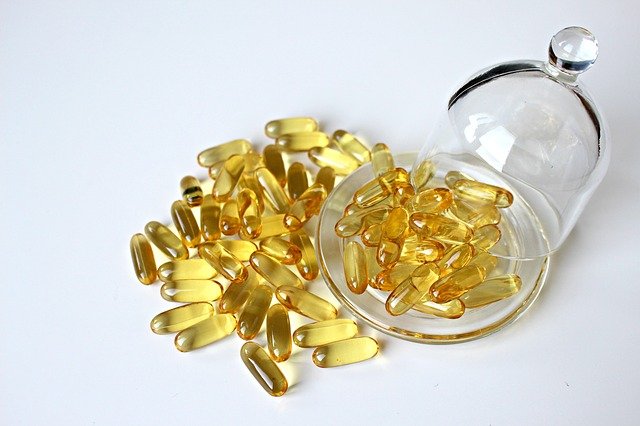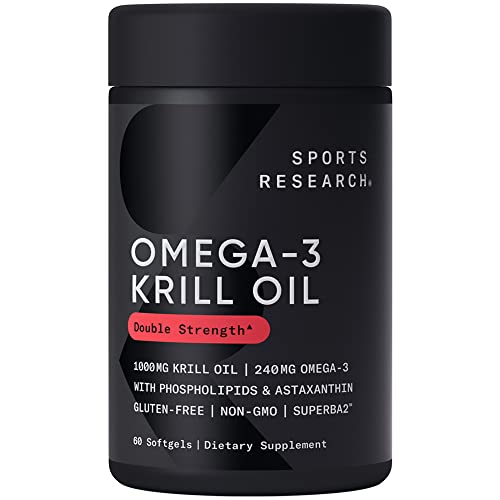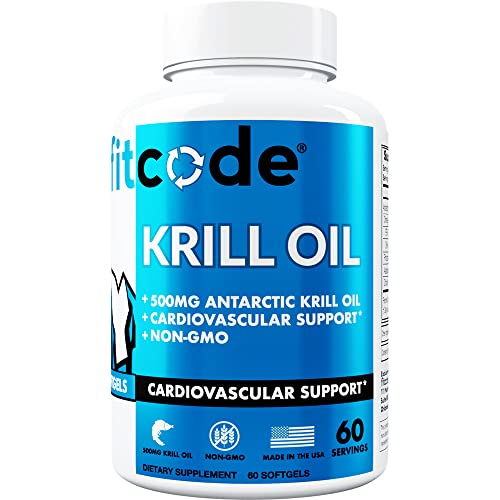
If you’re like most people, you’re always looking for ways to improve your health. That’s why so many people are interested in supplements like krill oil. But not all krill oil supplements are created equal. So how do you know which one is right for you?
The team at Consumer Reports has conducted extensive research on the best krill oil supplements available, and they have published their findings in a new report. In this report, they evaluate best krill oil supplement consumer reports based on factors such as quality, purity, and price.
So if you’re looking for a reliable krill oil supplement, be sure to check out the latest report from Consumer Reports. It includes detailed information on each product that was evaluated.
Top 10 Best Krill Oil Supplement to Buy in 2022:
Table of Contents
What is krill oil?
Krill oil is a supplement that comes from krill. It has over 50% more omega-3 than fish oil and makes it a great solution for those who do not like the taste of fish. A lot of doctors recommend this type of fat because it helps with inflammation, reduces asthma symptoms and can help those looking to lose weight as well as dealing with arthritis.
The reason why krill oil supplements are so beneficial for those who suffer from heart disease or high triglycerides is because they contain essential fatty acids (Esa’s) which reduce blood clotting time and enhances the immune system. The reason why people use this product is because it contains large amounts of antioxidants and Eesa’s which helps decrease pain caused by inflammation and reduces the risk of cancer by keeping cells healthy.
The difference between krill oil and fish oil is that it contains the antioxidant astaxanthin which makes sure your stomach does not break down the omega-3 fatty acids before they make their way to your intestine where they are needed. The other element in krill oil supplements is phospholipids which allow fat to be absorbed more quickly into your system.
Krill oil comes from a type of crustacean and can lower triglycerides, reduce joint pain and help with weight loss, all while protecting you against cardiovascular disease. Unlike other omega-3 products, this allows you to absorb three times as much fat while also increasing energy levels, improving brain function and promoting overall health. A great way to enjoy all of the benefits krill oil and fish oil has is by using a supplement which helps with your daily intake of fatty acids and antioxidants.
Having an unhealthy diet can lead to fatal diseases such as cardiovascular disease, cancer or diabetes, but this type of fat makes sure that you get the proper omega 3 acid every day. For those who do not like eating fish will benefit from taking this product since it helps with joint pain and weight loss while also lowering triglyceride levels in your body.
If you are looking for a quick solution to enjoying what both types of supplements have to offer then take a look at some krill oil weight loss options. This is a great way for you enjoy all the health benefits these supplements can offer without running the risk of burping up a fishy taste in your mouth.
Who Should Not Take Krill Oil?
Krill oil has been a big hit with many health-conscious consumers. It is a relatively new supplement with some impressive properties, which may make it a suitable partner in your healthy lifestyle. Krill is a delicacy in the Northern Hemisphere and has been used for centuries as both food and medicine by the Inuit people of Alaska and Canada. They used to catch krill with their bare hands. These days, however , catching krill requires special nets that allow the tiny zooplankton through while preventing larger animals from entering.
What makes krill so popular today also makes it vulnerable: it is very high on the food chain and can easily become contaminated by pollutants in its environment. As much as 80% of the world’s krill catch is used simply to feed other animals like salmon, pigs, and chickens. So if you are an environmentally conscious person, krill may not be your best choice for omega-3 supplementation.
Krill oil supplements are derived from Antarctic krill ( Euphausia superba ). If you suffer from certain allergies or sensitivities, then taking this supplement might cause some problems. These little crustaceans are closely related to shrimp and lobster — which means that they can cause allergic reactions in people who are sensitive to shellfish.
People with fish or seafood allergies should not take krill oil, because it may contain trace amounts of these ingredients.
Many fish oils on the market are derived from fish like anchovies and sardines. If you are allergic to fish or worried about other potential sources of contamination, then you should check the label to make sure that your supplement is free of items like “fish,” “shrimp,” and “shellfish.”
People who suffer from certain medical conditions should also avoid taking this supplement. The best krill oil supplement consumer reports might not be safe for people with diabetes, bleeding disorders, depression , high blood pressure, or kidney disease.
How Long Does It Take To Feel The Effects Of Krill Oil?
Krill oil is a less expensive, more readily available source of omega-3 fatty acids. Krill oil contains omega-3s in phospholipid form, which have been found to be better absorbed than the triglyceride form found in fish oil supplements. However, question still exists about how long it takes for krill oil to exhibit its beneficial effects. The following article will investigate this question further.
Estimated time until participants began to report improvements in well-being was 29 days among subjects supplementing with krill oil and 28 days among participants who supplemented with fish oil . Thus, results show that there does not appear to be any significant difference between the two groups based on when they started noticing positive changes after supplementation.
The study involved 120 healthy adults aged 18-45 years who took either krill oil or fish oil each day for 24 weeks. Participants were asked to fill out questionnaires on their levels of depression, anxiety and stress before starting supplementation and at 3, 6, 12, 18 and 24 weeks while taking the supplement.
Results showed that at least half of participants in both groups started to feel better within 12 weeks . Out of 54 people using best krill oil supplement consumer reports , 47% noticed improvements in well-being at 12 weeks compared with 37% of 53 people using fish oil . Furthermore, by week 18 , 59% of the krill group felt better compared with 48% among the fish group. However, it appears that some participants continued to get better during the last few weeks of the study period.
Conclusion: Krill oil supplementation resulted in significant improvements in well-being by 12 weeks, which gradually increased over time . Although most participants noticed improvements within 12 weeks, others continued to experience benefits throughout the remaining time they were taking their supplements.
When Should I Take Krill Oil Morning Or Night?
There are two schools of thought here. Some experts recommend taking krill oil at night because krill is so high in phospholipids, which can have a blood thinning effect. The idea is that taking the supplement at night improves sleep quality by reducing nighttime clotting and lessens risk of stroke or heart attack by averting potential problems associated with reduced blood flow during slumber.
However, many other experts believe that the body produces maximum levels of inflammation when you’re sleeping—and inflammation is what drives cardiovascular diseases like atherosclerosis and heart disease, which are linked to reduced blood flow, increased platelet adhesion and aggregation, atherogenesis (the buildup of fatty plaque that narrows arteries), and the myriad other problems associated with CHD.
These experts recommend taking krill oil in the morning because it helps protect against cardiovascular inflammation over the course of a day. Only you can choose your preference—or switch between options depending on what suits your lifestyle best. For instance, if you find that when you take best krill oil supplement consumer reports at night before bed your sleep is disturbed by nightmares or insomnia, try taking it in the morning instead.
What Is Krill Good For?
Many people who are interested in nutrition and health have heard of the benefits of taking fish oil. They know that it’s great for cardiovascular health, brain function, immune system function, and more. But what exactly is fish oil? It turns out that fish oil is simply oil extracted from sardines or anchovies. Then why don’t we just take the fish directly?
Well, you see there’s a problem with doing that: where would all those little guys live if everyone started eating them all up? And how would they reproduce without getting eaten by predators like dolphins or sharks or us humans before their eggs had a chance to hatch? Some species of fish get eaten by smaller fish; some get eaten by larger fish; some get eaten by dolphins or whales or sharks.
Krill, however, are too small to be considered for human consumption (although they’re considered a delicacy in some countries), and because of their size they’re not considered to be part of the food chain. Plus, krill reproduce much more quickly than other types of seafood so there’s no danger of over-fishing which results in depletion or eventual extinction.
So what exactly is krill? Well… it turns out that krill is actually made up of shrimp-like crustaceans – marine animals with exoskeletons, jointed legs and limited mobility outside water. This means that just like shrimp, its meat has almost no fat content at all. And this is the reason many people take krill oil as a dietary supplement: it’s packed with omega-3 fatty acids and antioxidants, which means it can help you to protect your cardiovascular system and maintain good brain function.
The difference between fish and krill oil supplements? While both types of oils come from marine animals, fish oil comes from larger fish whereas krill oil comes from shrimp-like crustaceans called Euphausiids. And although they look similar, there are some very big differences between them that may make one or the other more suitable for you. Fish such as anchovies and sardines (which are used to obtain most fish oils), eat smaller sea creatures like plankton and algae; whereas krill feed on phytoplankton and algae, which means they are at the bottom of the food chain. And if you’re wondering what that has to do with anything, it’s this: krill oil is more sustainable than fish oil because it doesn’t have any predators of its own.
Another big difference between fish and krill oils? They taste different! Fish oil supplements are often slightly creamier in flavor, whereas krill oil is still oil but tastes a bit saltier. There’s also the fact that most people prefer to take their supplements in liquid form – either as softgels or by adding them directly to water or juice – both of which are much easier when you use liquid supplement. Finally there’s the fact that fish are often high in mercury, whereas krill is considered one of the least toxic marine species. So what you need to do is determine your dietary needs and choose whether you’d rather take fish or krill oil supplements.
Getting omega-3 fatty acids through foods like wild salmon, walnuts, flax seeds and even green leafy vegetables can be very healthy for some people. But there are certain dietary issues which may prevent them from getting enough of these fatty acids into their diet naturally. Fish oil supplements supply us with not only omega-3 fatty acids but also antioxidants; this combination makes it possible for anyone – including vegetarians – to enjoy good health. And they’re sustainable too!
FAQs About Best Krill Oil Supplement Consumer Reports
What Is Krill?
Krill are shrimp-like crustaceans that live in the ocean. They feed primarily on phytoplankton and play a key role in maintaining healthy ocean ecosystems, as well as protecting marine life against predators.
Does Krill Oil Come From Farmed Or Wild-Caught Krill?
Most Antarctic krill oil supplements are made with wild-caught Antarctic krill, but some companies use farmed krill. Wild-caught sources of the deep blue sea’s delicacies ensures its purity and potency.
How Much Omega 3 Does One Capsule Of Krill Oil Contain?
One capsule of krill oil typically contains about 550 mg of omega-3 fatty acids.
How Often Should I Take Krill Oil Supplements?
Most experts recommend taking one to two capsules per day with food. Some people start off slowly and work up to the recommended serving size over time as their bodies adjust. It is important that you follow your doctor’s or health care practitioner’s advice on how much and how often to take Krill Oil Capsules (NKO) . Also, be sure to follow the manufacturer’s dosing recommendations listed on the product label.
What Are Some Benefits Of Taking A Daily Krill Oil Supplement?
The best krill oil supplement consumer reports is a potent source of omega-3 fatty acids, including EPA and DHA. Omega-3 fatty acids have been shown to support heart health, joint mobility and flexibility, healthy skin and hair, brain function and mood, the development of the eyes and nervous system in babies during pregnancy and nursing , metabolic rate, immune function , circulation , energy levels , immunity from colds/flu virus.
What Are Krill Oil Side Effects?
There are no known side effects if taken as recommended by your doctor or health care provider. Occasional mild stomach discomfort may result when starting a supplement program for the first time. If you experience any unusual symptoms after beginning supplementation with krill oil, discontinue use and consult your doctor or health care practitioner immediately.
Is It Safe For Me To Take Krill Oil If I Am Pregnant?
Many experts recommend that women who are pregnant or nursing discuss the use of dietary supplements with their doctors before taking krill oil supplements. Natural sources of omega-3s provide fetuses and babies with important fatty acids needed for healthy development , so most experts suggest limiting krill oil supplementation during pregnancy and focus on eating a well-balanced, nutritious diet instead . While there is no research linking krill oil directly to any negative side effects in developing fetuses, some people prefer they avoid it until more is known about its safety during pregnancy. If you’re pregnant or nursing, check with your doctor before beginning supplementation with krill oil.
>>> See more: Is krill oil better than fish oil? | Best krill oil supplement consumer reports
Conclusion
Krill oil supplements are a popular choice for people looking to improve their health. In our review of the best krill oil supplement consumer reports, we looked at Consumer Reports data to find the top-rated products. We found that those who rated the highest had high levels of antioxidants and omega-3 fatty acids. They also had low levels of contaminants. If you’re looking for a quality krill oil supplement, be sure to look for one that has high levels of antioxidants and omega-3 fatty acids, and is free from contaminants.
Read more:













